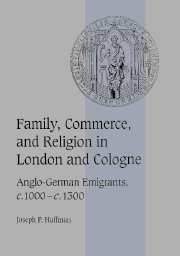Book contents
- Frontmatter
- Contents
- Preface
- List of abbreviations
- The wards of medieval London
- The parishes and districts of medieval Cologne
- Anglo-Cologne family genealogies
- Introduction
- Part I The historical background: Anglo-German commercial foundations and the city of Cologne
- Part II Anglo-Cologne family, property, and inheritance ties
- Chapter 4 The formation of individual and family identity in medieval Cologne: property and surnames
- Chapter 5 Anglicus in Colonia: the social, economic, and legal status of the English in Cologne during the twelfth and thirteenth centuries
- Chapter 6 Cologne families with English connections: the Zudendorps
- Chapter 7 Cologners in England
- Part III Anglo-German religious and cultural life
- Conclusion: A reappraisal of the Anglo-German nexus
- Appendix: The archbishops of Cologne
- Select Bibliography
- Index
- Cambridge Studies in Medieval Life and Thought Fourth series
Chapter 6 - Cologne families with English connections: the Zudendorps
Published online by Cambridge University Press: 02 November 2009
- Frontmatter
- Contents
- Preface
- List of abbreviations
- The wards of medieval London
- The parishes and districts of medieval Cologne
- Anglo-Cologne family genealogies
- Introduction
- Part I The historical background: Anglo-German commercial foundations and the city of Cologne
- Part II Anglo-Cologne family, property, and inheritance ties
- Chapter 4 The formation of individual and family identity in medieval Cologne: property and surnames
- Chapter 5 Anglicus in Colonia: the social, economic, and legal status of the English in Cologne during the twelfth and thirteenth centuries
- Chapter 6 Cologne families with English connections: the Zudendorps
- Chapter 7 Cologners in England
- Part III Anglo-German religious and cultural life
- Conclusion: A reappraisal of the Anglo-German nexus
- Appendix: The archbishops of Cologne
- Select Bibliography
- Index
- Cambridge Studies in Medieval Life and Thought Fourth series
Summary
The Schreinsurkunden contain a rich store of material as well on many Cologne families that maintained intensive and enduring relations with England, either through trade or through diplomatic service. One such family and its history of diplomatic activity in England is the main focus of this chapter, and then in the following chapter we shall consider other Cologners who appear in English documents. When the Cologne municipal records are integrated with English royal documents the remarkable rise to prominence and surprising interregional activity of one particular Cologne ministerialis (i.e. dienestman or “unfree knight”) household emerges. We have already met some members of this family, known by the surname “de Zudendorp,” in the prior chapter. Yet there is a great deal more to be said about the family.
The Zudendorp Geschlecht was perhaps the most fascinating of all the Cologne families that maintained relations with England and the English during the twelfth and thirteenth centuries. Its members began their rise to prominence as ministeriales of the archbishops of Cologne and eventually, through service as ambassadors to the English court, became intimately involved in archiepiscopal negotiations with both the English and imperial courts. The wealth and high social status they achieved thereby is reflected in both the large number of houses and other property they accumulated in Cologne as well as in their marriage ties to many of the leading patrician families of the city.
- Type
- Chapter
- Information
- Family, Commerce, and Religion in London and CologneAnglo-German Emigrants, c.1000–c.1300, pp. 128 - 161Publisher: Cambridge University PressPrint publication year: 1998



